Apr 08, 2013
Cinespace Chicago creates stage for DePaul film students
Cinespace Chicago creates stage for DePaul film students
CHICAGO — DePaul University’s School of Cinema and Interactive Media is teaming up with Cinespace Chicago, the city’s premier movie studio, to create a learning environment that will provide students with film and television production experience in the midst of a working studio.
Under the arrangement, Cinespace Chicago will provide an exclusive cinema production stage and design space for DePaul’s cinema students — only a few doors down from where the TV show “Chicago Fire” is being filmed.
“DePaul students will experience this truly unique opportunity, where their classroom — their dedicated stage — is on an active studio lot,” said Matthew Irvine, director of the school and an associate professor who teaches screenwriting and directing.
“There’s no other film program like this,” said Irvine. “Right in the heart of the country, right in Chicago, it’s going to be a one-of-a-kind opportunity for students who want to get involved in the film and media industry; to work shoulder-to-shoulder with industry professionals who are working on current productions.”
David Miller, dean of DePaul’s College of Computing and Digital Media, where Cinema and Interactive Media is housed, noted the advantage that this dedicated stage space will offer students. “Our cinema program develops complete filmmakers, with experience ranging from screenwriting through post-production and distribution. With this Cinespace alliance, our students will have access to the latest professional film and television production equipment on a stage located in the center of one of the largest film and TV studios in the country.”
Professional stage and equipment
The university’s production space has a ground-level 20,000-square-foot footprint, including a 10,000-square-foot soundproof stage and a second-level instructional support space. Additional space will house a prop shop, offices and set storage.
“The use of our stage is really twofold,” said the dean. “One is that we will have classes there so that students will learn in a professional environment and use industry tools and techniques. Also, outside of regular classes, we will have the ability for students and faculty to build sets and do professional filming of their own work.”
A new Alexa camera system is among the professional stage equipment DePaul students will use, along with green-screen stages, set design equipment, 3-D camera rigs, motion-controlled camera systems and a fully loaded three-ton grip truck.
“DePaul’s alliance with Cinespace Chicago is a novel way to provide our students with an incredible opportunity to gain real world experience while at the same time developing a skilled workforce for the expanding Chicago film industry,” said the Rev. Dennis H. Holtschneider, C.M., university president. “DePaul is excited about this alliance and the possibilities of bringing more film and TV productions to our city and state.”
Students cinched the deal
According to Irvine, it was the caliber of DePaul’s cinema program and its students that led Cinespace to align with DePaul. “I think at Cinespace they like the fact that we’re hungry, we’re young and the students sold it for them; our students are professional, hardworking, polite and incredibly talented,” Irvine said.
Totaling more than 2.5 million square feet of space on over 120 acres, Cinespace Film Studios is North America’s largest developer, owner and operator of film, television and digital media production space. It was founded in 1988 in Toronto by brothers Nick, Larry and Steve Mirkopoulos. Having developed five studio facilities in Toronto, the organization expanded into Chicago in 2009. Cinespace remains a family-owned and operated business, with Nick Mirkopoulos as chairman. The Chicago facility is operated locally by the Pissios and Degnen families.
Mirkopoulos summarized his enthusiasm for the project. “Having never been fortunate enough to receive a formal education, I take extra special pride in this unique life accomplishment — to help students learn in a real working environment, in order to be better equipped to work and to prosper right after their studies.
Growing the next crop of filmmakers
“Against the backdrop of war-torn, agrarian Europe, my education was in farming, and we are actually farming here in Chicago with DePaul: We are planting seeds, we are nurturing and protecting, and we will be harvesting knowledgeable, experienced and confident human beings in one of the most economically viable sectors of our economy,” said Mirkopoulos. “I am very grateful to DePaul for this opportunity, and I feel that our future industry will look back and be grateful for this partnership.”
Business partner Alex Pissios said he is excited about what the alliance means for DePaul’s cinema students. “The biggest benefit for these students is to be able to integrate with industry professionals on the same property. They will learn the most advanced techniques in camera and lighting and receive top certifications in equipment and safety training.
“On top of all that, Cinespace will offer three content-creation grants per year, to give highly creative DePaul students the opportunity to graduate with their own completed project as their calling card,” said Pissios. “All in all, this will be an excellent launching pad for the workforce.”
Making movies Chicago style
Opened in May 2011, Cinespace Chicago sits on the site of the former Ryerson steel plant in the city’s North Lawndale neighborhood, a few miles from downtown. When fully built out with 1.5 million square feet of space on over 80 acres, Cinespace Chicago is expected to rank as the largest studio in the U.S. outside of Hollywood.
The term of the DePaul-Cinespace Chicago alliance is initially five years, with the expectation that the alliance would continue as part of a long-term arrangement. DePaul’s studio space is expected to be fully functional by June. Both students and faculty are already in pre-production on films that will be shooting on the stage this summer.
As part of the arrangement, Cinespace Chicago is working to ensure that its production space tenants incorporate DePaul student interns into their workforce plans. The alliance will foster implementation of an apprenticeship program similar to those developed in Hollywood. Cinespace Chicago wants to create an apprenticeship program in which DePaul students will be able to shadow a director, cinematographer and other production heads to learn first-hand from industry leaders.
DePaul students already are involved with the Lionsgate-Summit Entertainment trilogy “Divergent,” which is in pre-production. USA Network’s “Sirens,” a comedy by Denis Leary will also be filmed at Cinespace Chicago, where the series “Boss” was shot.
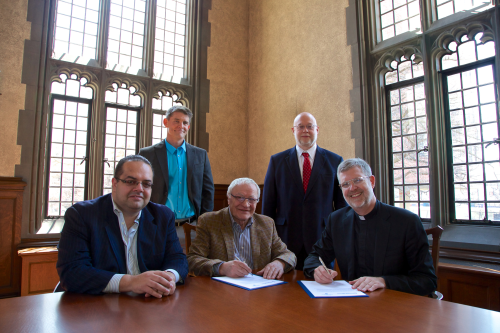
Film students at DePaul University will learn the craft on their own soundstage in the midst of a working movie studio under an agreement between the university and Cinespace Chicago Film Studios. Meeting recently to memorialize the alliance were (seated from left) Alex Pissios, president, Cinespace Chicago; Nick Mirkopoulos, chairman, Cinespace Film Studios; and the Rev. Dennis H. Holtschneider, C.M., president, DePaul University; and (standing, from left) Matthew Irvine, director, School of Cinema and Interactive Media; and David Miller, dean, College of Computing and Digital Media. (Jeff Carrion/DePaul University Photo)
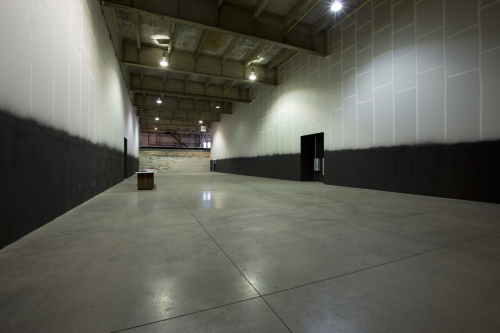
This cavernous 10,000-square-foot space at Cinespace Chicago Film Studios is being converted into a soundstage for the exclusive use by students and faculty at DePaul University’s School of Cinema and Interactive Media, an academic unit in the College of Computing and Digital Media. (Thomas Vangel/DePaul University Photo)
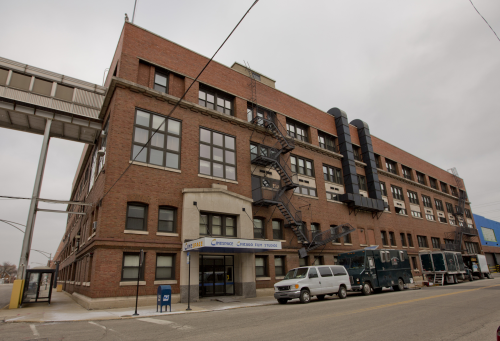
Cinespace Chicago Film Studios, the city's premier movie studio that opened in May 2011, sits on the site of the former Ryerson steel plant. When fully built out with 1.5 million square feet of space on more than 80 acres, Cinespace Chicago is expected to rank as the largest studio in the U.S. outside of Hollywood. It recently teamed up with DePaul University's School of Cinema and Interactive Media to provide film students with their own soundstage inside the working film studio. (Thomas Vangel/DePaul University Photo)
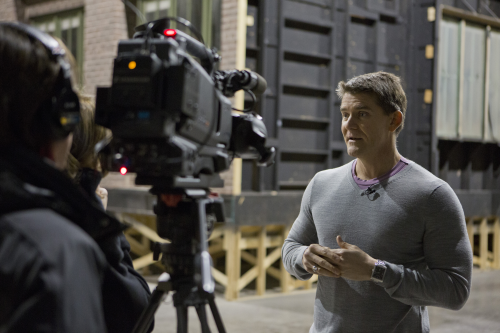
“We’re hungry, we’re young and the students sold it for them,” said Matthew Irvine, of reasons why Cinespace Chicago Film Studios teamed up with DePaul University to provide film students with their own soundstage inside a working film studio. “Our students are professional, hardworking, polite and incredibly talented,” said Irvine, director of DePaul’s School of Cinema and Interactive Media, where he teaches screenwriting and directing. (Thomas Vangel/DePaul University Photo)
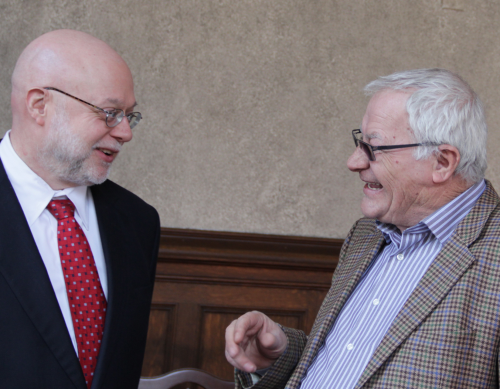
David Miller, left, dean of the College of Computing and Digital Media, meets with Nick Mirkopoulos, chairman of Cinespace Film Studios. Mirkopoulos noted, “Having never been fortunate enough to receive a formal education, I take extra special pride in this unique life accomplishment — to help students learn in a real working environment, in order to be better equipped to work and to prosper right after their studies.” DePaul film students and faculty will have their own soundstage in the midst of Mirkopoulos’ Chicago-based operations on the city’s West Side. (Carol Hughes/DePaul University Photo)
